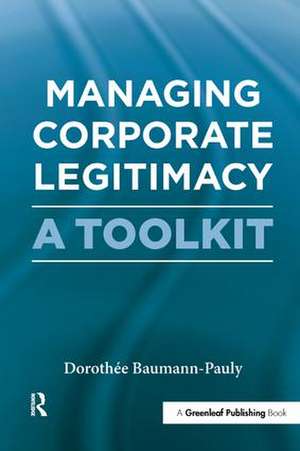Managing Corporate Legitimacy: A Toolkit
Autor Dorothée Baumann-Paulyen Limba Engleză Hardback – 25 sep 2013
The tool structures the implementation process in five learning stages (defensive, compliance, managerial, strategic and civil). The final civil stage describes political corporate behaviour. The author includes an empirical assessment of five Swiss multinationals in this book which reveals that most companies – even those with relatively long-standing and mature policies on social and environmental issues – have only just started to learn how to become corporate citizens. The book therefore concludes with a discussion of an issue-specific extension of the assessment tool and presents methods for setting priorities in the approach to corporate citizenship that may also facilitate corporate engagement with stakeholders.
The tools developed in this book provide practical and detailed guidance for implementing and embedding CC and managing corporate legitimacy. It will be essential reading for practitioners looking for ways to legitimize their engagement with societal issues and for academics considering how we can better measure the engagement of business with CC.
Preț: 353.80 lei
Preț vechi: 455.07 lei
-22% Nou
Puncte Express: 531
Preț estimativ în valută:
67.71€ • 70.29$ • 56.46£
67.71€ • 70.29$ • 56.46£
Carte tipărită la comandă
Livrare economică 22 martie-05 aprilie
Preluare comenzi: 021 569.72.76
Specificații
ISBN-13: 9781906093945
ISBN-10: 1906093946
Pagini: 252
Ilustrații: black & white illustrations, black & white tables, figures
Dimensiuni: 156 x 234 x 20 mm
Greutate: 0.5 kg
Ediția:1
Editura: Taylor & Francis
Colecția Routledge
Locul publicării:Oxford, United Kingdom
ISBN-10: 1906093946
Pagini: 252
Ilustrații: black & white illustrations, black & white tables, figures
Dimensiuni: 156 x 234 x 20 mm
Greutate: 0.5 kg
Ediția:1
Editura: Taylor & Francis
Colecția Routledge
Locul publicării:Oxford, United Kingdom
Public țintă
PostgraduateCuprins
1. Global rules — private actors: The role of the MNC in global governance1.1. MNCs in global governance1.2. Research gaps1.3. Aim of the research1.4. Structure of the research 2. Mapping the theoretical foundations for defining the role of the MNC in a global economy2.1. Theoretical background and key concepts2.2. New theoretical developments in political science and business administration 3. Bridging theory and practice — Developing an assessment tool for corporate citizenship3.1. Developing an ideal of CC3.2. Putting CC into practice3.3. Results of expert interviews and analysis of best practices3.4. Learning to implement CC3.5. Developing the assessment tool 4. Assessing corporate citizenship — an empirical study of Swiss UNGC participants4.1. The methodological approach to the empirical study4.2. Case study results—implementation of CC according to three dimensions4.3. Summary of empirical results4.4. Limitations of the empirical research 5. Discussion of the empirical findings5.1. Practical implications5.2. Theoretical implications 6. Refining the assessment tool6.1. Introducing an issue-specific dimension to the assessment of CC6.2. Prioritizing issues and maintaining corporate legitimacy 7. Conclusions and further researchBibliographyAppendices
Descriere
This book develops tools for assessing corporate citizenship, looking at the role of the corporation as a private actor in global governance at conceptual and empirical levels. It uses a toolkit to develop approaches to corporate citizenship in practice, and includes an empirical assessment of five Swiss multinationals.











